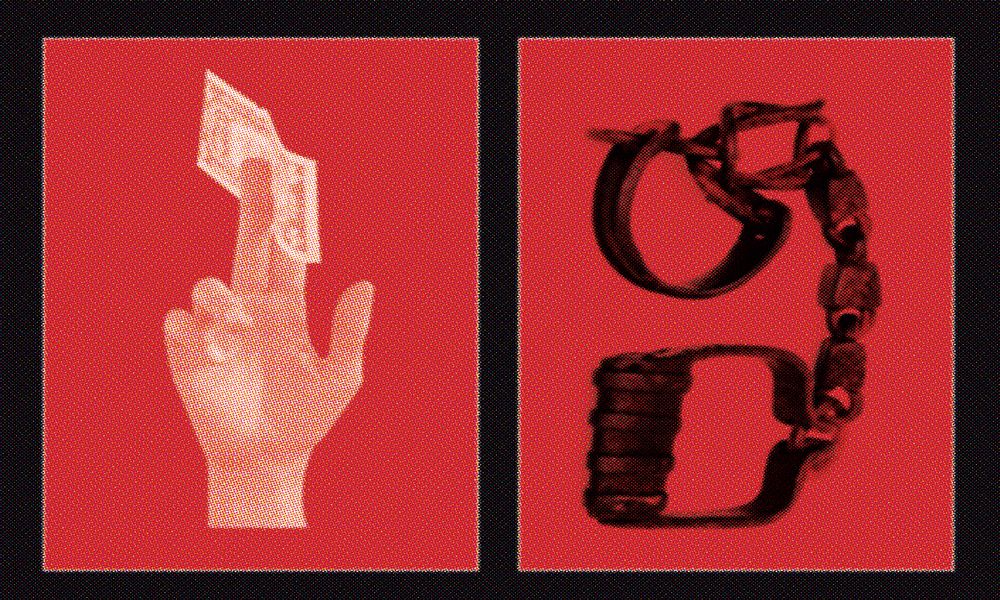HUMANIST
Our tradition’s guidance about what we call “dirty money” generally refers to funds acquired by theft. Maimonides, for example, warns against accepting charity from known thieves. This should be obvious. It’s not an ethical stretch to ask that when we discover contributions from stolen funds, they should be returned, preferably to law enforcement. Today, however, “dirty money” isn’t always about theft. No one has accused Harvey Weinstein of financial crimes, but charities that retain his gifts should realize that this creates the appearance of bestowing a kind of hechsher (“kosher stamp”) on the man himself. In this case, recipients have two choices: return the money or—when permitted—redirect it to those who fight sexual harassment.
One word of caution is warranted. As a Humanist I’m aware of contributions rejected due to fears that funds from “non-believers” are “dirty,” too. When the Stiefel Freethought Foundation gave $250,000 to the American Cancer Society, the organization returned the gift. Several other groups have rejected needed funds awarded by the Humanistic giving group Foundation Beyond Belief. Neither funder requires recipients to support Humanism. It is crucial to consider the sources of contribution, but we should also be prudent in defining “dirty money.”
Jeffrey L. Falick
Birmingham Temple Congregation for Humanistic Judaism
Farmington Hills, MI
INDEPENDENT
Biblically speaking, it should not be benefited from, as we see in the stories of Achan (Joshua 7) and Saul (First Samuel 15). In both instances, the spoils of war were taken when it was forbidden to do so. Achan and his kin perished; Saul lost the crown. But the remaining question is: What if we received the money innocently, and only later discovered it was dirty? In such an instance, I would redirect the funds to benefit those by whose victimization it was amassed. And if the money had been swindled, then yes, return it, as we read in the midrash: “He said to me, ‘Rabbi, it happened that I sold to a star-worshipper four kurs of dates…and because it was dark, I measured out a half bushel less than what he paid for. I then took the money and bought a pouch of oil for myself and put it in the same place where I had sold those dates. But the pouch burst and the oil spilled and vanished.’ I said to him, ‘My son—it is written in the Torah, ‘You shall not swindle your fellow’ [Leviticus 19:13]. Your fellow is like your own brother [Jewish or not].’” (Tana D’Bei Eliyahu 15).
Rabbi Gershon Winkler
Jewish Chaplain, Patton State Hospital
Patton, CA
RENEWAL
A mishnah pertaining to the holiday of Sukkot asks whether a person can fulfill one of the holiday’s key mitzvot—shaking the lulav, or palm branch—using a stolen lulav. While the mishnah essentially says no, the ancient rabbis of the Talmud add nuance: One can do so, some say, just not on the first day of the holiday. Like them, we can see both sides: On the one hand, how can we do good with something which was taken through unjust means? On the other hand, isn’t it possible to fulfill one mitzvah while breaking another? Engaging in one transgression does not mean that all of one’s actions are transgressions. In fact, elsewhere in the Talmud, it says in the name of Rav: “A person should always engage in Torah and mitzvot even if it’s for the wrong reasons, because doing something for the wrong reasons may lead to doing it for the right reasons.” (Babylonian Talmud, Nazir 23b.) If this is so, perhaps “dirty money,” if used for good, may lead to the transgressor’s repentance. If the “dirty money” was stolen, and it can’t be returned to its rightful place, isn’t using it for tzedakah better than stuffing the thief’s pockets?
Rabbi Elyssa Joy Austerklein
Beth El Congregation
Akron, OH
RECONSTRUCTIONIST
Money attained through illegal activity must definitely be returned, according to Jewish law. Money given by someone who acquired it legally but is associated with past unethical and immoral activity is more complicated. If the gift is a part of a genuine process of teshuvah (repentance), then the mitzvah of tzedakah is to be encouraged. The complication, however, is that very large gifts can themselves be used by the giver as a way to wield power and cover wrongdoing. That is neither tzedakah nor teshuvah and should not be accepted. Some acts of wrongdoing are so heinous and harmful that any tzedakah from the wrongdoer should go toward the victims of the immoral activity rather than to institutions that might glorify the giver’s family name.
At the root of this question, however, is another moral sin that distorts the dynamics of giving and creates strong incentives to keep even questionable donations—extreme economic inequality in our society. Very low tax rates on the wealthiest Americans mean less public money to fund social services, education and arts organizations, which are then more dependent on super-large donors. That is not a healthy environment for tzedakah generally.
The Torah addresses extreme economic inequality when it discusses the sabbatical and jubilee year, and prophets address it (Isaiah 5:8). So should we. In doing so, we embrace the mitzvah of public and communal responsibility for each other, as well as the mitzvah of generous tzedakah at all levels.
Rabbi Caryn Broitman
Martha’s Vineyard Hebrew Center
Vineyard Haven, MA
REFORM
The ethics of using “dirty money” has been a topic of conversation in Jewish circles for millennia. The Talmud considers funds generated from harlotry to be unusable for the purchase of gifts to the Temple, unless those funds have been converted in some way, such as corn turned to flour, or olives turned to olive oil.
Yet, on the other hand, there are rabbinic sources that suggest we cannot prevent a person from doing a mitzvah. Maimonides implies that to refuse a gift from a criminal would cause us to add to that criminal’s sin, since they would be unable to fulfill their obligation to give tzedakah. However, accepting such gifts does not require public recognition of the donor, for that would give honor to a person who is not worthy of it.
With these ethical considerations in mind, it would be reasonable to contemplate how we might put funds from such sources to constructive use. I wonder how the recipients of those funds might convert them into new forms of resources that could benefit victims, be invested in causes or directed toward initiatives that would serve more sacred purposes.
Rabbi Dr. Laura Novak Winer
Fresno, CA
CONSERVATIVE
When considering this question, I turn to the work of my teacher Rabbi Elliot Dorff, who in June 2009 wrote a paper for the Conservative movement’s Committee on Jewish Law and Standards entitled “Donations from Ill-Gotten Gain.” Dorff’s short answer to this question is no, the money need not be returned. He explores many of the ethical issues that surface when considering this question.
What is dirty or ill-gotten money? We would all agree that stolen money is dirty. But is money dirty if it is legally earned but morally tainted or socially unacceptable? For example, would we accept donations from a company that sells tobacco? Or from a man who imports clothing that is made in the sweatshops of China? How is it decided what money is morally tainted or socially unacceptable?
Charitable organizations must be able to trust that the donations they receive are earned legally and honestly. It would be an onerous burden to expect nonprofits to investigate how the money being donated is earned. However, if the donation were to come from a known thief (ganav mefursam), the organization accepting the gift would need to investigate the source of the money being offered.
Rabbi Amy Wallk Katz
Temple Beth El
Springfield, MA
MODERN ORTHODOX
The Torah states that the wages of prostitution should not be brought into the Temple in fulfillment of any vow (Deuteronomy 23:19). This is a direct precedent for returning dirty money and not using it for sacred purposes. As a generalization, let me specify: Where accepting the money would be perceived as legitimating the bad behavior of the donor, then the money should be refused or returned.
Nevertheless, I feel that the poor—and the good causes—need the money more than we need the feeling of righteousness that we have returned the money. So let me put limits on this refusal policy. The money need not be returned, 1) when the dirty money’s source was marginal to the philanthropist’s overall wealth and actual giving; 2) when the recipient organization, innocent of the dirty money aspect, spent the money and cannot recall it without hardship; 3) when the behavior itself is offensive but does not reach the level of being morally repugnant.
I close with a reminder that the Rockefeller Foundation—founded out of profits generated by abusive monopolistic business practices—within a generation had evolved into one of the great humanitarian and socially responsible philanthropies of the world.
Rabbi Yitzhak Greenberg
Riverdale, NY
ORTHODOX
One important yardstick for ill-gotten gains is: Will the receipt of such money commit you to furthering the criminal or immoral act? Halacha disallows benefiting from stolen goods because by purchasing them, even legally, you encourage theft. So taking donations from people whose business ethics are seriously compromised shows social approval for a behavior that will continue. Ironically, Jeffrey Epstein-type behavior does not require social approval; it’s part of a warped personality and a predilection to a particular kind of evil that requires no further encouragement.
A particular Hasidic rebbe in Europe was known to have three different policies toward contributions. Those that came from average people, he would use for his salary and personal expenses. For institutions considered holy—the synagogue, study halls, etc.—he would accept donations only from glatt kosher sources, free of any taint of impropriety. And when he received donations in cash from people he knew to be seriously compromised, he would use the bills to light his cigars. So an enterprise you consider to be of greater spiritual value requires greater oversight as to the message you send out about it.
There is a source on this in the Talmud which I love, about a component of the incense used in the Temple. The Gemara says that mei raglayim (generally translated as urine) would do a better job, but you can’t use mei raglayim in a holy place. One medieval commentator says no, mei raglayim is not urine—it’s just a yellow substance that reminded people of urine. So in dealing with the holy, you try to distinguish it as much as possible from the ugly and the unseemly. In other words, if you name a school building after someone who did multiple terms in prison, it might not be technically forbidden, but what message are you sending about the enterprise?
Rabbi Yitzchok Adlerstein
Cross-Currents
Los Angeles, CA
SEPHARDIC
Money obtained illegally or immorally cannot be laundered by giving portions of it to charitable causes, as noble as they may be. By accepting such a donation, we assist the criminal and, in a way, become accomplices. I would like to believe that most people accept this simple logic, but I assume some would argue that, although we should reject a donation offered by a known or convicted criminal, one need not return a donation made before that information was exposed. In this view, since the receiver was unaware of the non-kosher origin of the donation, he is not an accomplice. I would ask the proponents of this approach what they would do if they were the victims. Wouldn’t they want the money returned to them?
Others suggest making a distinction based on the donation’s destination: A museum or playhouse should return the money, perhaps, but a hospital or soup kitchen should not because it is saving lives. I would argue that in no case should the money be used as the giver intended, but rather, as much as possible, to amend the damage caused by the criminal. For example, money obtained from narcotics should be given to rehabilitation clinics.
Rabbi Haim Ovadia
Potomac, MD
CHABAD
Legally, it’s clear: Stolen money, like objects, must be returned. Further, as community leaders and institutions, it behooves us to send clear signals that dishonesty and unsavory business practices can never become “kosherized” by financial contributions, however generous, to even the most noble and worthy charitable causes.
On a deeper level, the discussion about “dirty money” highlights an important spiritual idea. We each engage a portion of this physical world during our lifetime. The choices we make along the way, whether they are G-dly or unG-dly, affect more than just our own personal spirituality. They also affect the spirituality of the physical places and things with which we engage. Money is “spiritually neutral” until we come along and make choices. If we earn the money honestly and use it in a G-dly manner, we have spiritually transformed and elevated it.
The same is true of our food and our homes, and of our cars, computers and technology. When we use our “slice of the world” for good and holy purposes, we are spiritually sanctifying a piece of that lowly world and, in Kabbalistic terms, creating a “dwelling place for the divine.”
Rabbi Yosef Landa
Chabad of Greater St. Louis
St. Louis, MO













